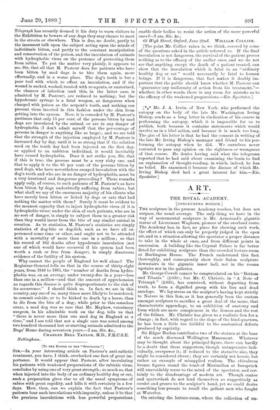[To THE EDITOR OY TEE "SPECTATOR:']
SIE,—In your interesting article on Pasteur's anti-rabietic treatment, you have, I think, overlooked one fact of great im- portance. It would appear that Pasteur, after inoculating his patients with weakened preparations of the rabietic virus, concludes by using one of very great strength ; so much so, that when injected into the body of an ordinary healthy dog or cat, such a preparation gives rise to all the usual symptoms of rabies with great rapidity, and kills it with certainty in a few -days. now, then, can we explain the fact that Pasteur's patients bear such inoculations with impunity, unless it be that the previous inoculations with less powerful preparations
enable their bodies to resist the action of the more powerful ones P—I am, Sir, &cc.,
62 High Street, Oxford, June 22nd. WILLIAM COLLIER.
[The point Mr. Collier raises is, we think, covered by some of the questions asked in the article referred to. If the final inoculation is not dangerous, the survival of the patient proves nothing as to the efficacy of the earlier ones, and we do not see that anything except the death of a patient treated, can show that the inoculation which is fatal to an " ordinary healthy dog or cat " would necessarily be fatal to human beings. If it is dangerous, that fact makes it doubly im- portant that the public should know whether M. Pasteur can "guarantee any uniformity of action from his treatment,"— whether, in other words, there is any room for mistake as to the efficacy of the weakened preparations.—En. Spectator.]


































 Previous page
Previous page